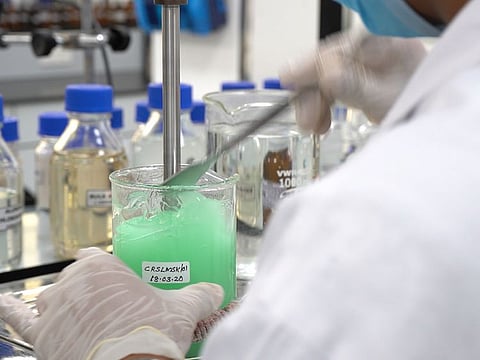Watch: How this UAE factory makes hand sanitiser
Production of 100,000 bottles a day raised to 200,000 during pandemic

Dubai: As the demand for hygeine and cleansing products skyrockets during the global coronavirus pandemic, one UAE-based company has dedicated their entire resources exclusively to the production of sanitisers.
Gulf News took a tour of Sterling Perfumes and Premier Cosmetics’ Dubai facility at Dubai Investment Park to find out how they make sanitisers from scratch.
“Due to the current market demand all three production lines are exclusively working on sanitisers,” said Abdul Shahid, Operation and Supply chain manager.
“Although some of our other products [such as shampoos and scrubs] are more profitable, the company prioritises the humanitarian motives behind sanitiser production during this difficult time.” The company also claims to currently be the biggest sanitiser manufacturer in the country.
“Our product is doing well in the market,” says Arefa Noor, marketing manager at Premier Cosmetics. “Our popular sanitiser sprays are getting sold out in two hours.”
The company is meeting the rising demand however, while they started producing 100,000 sanitiser bottles per day, they’ve pushed that up to 200,000 to meet the growing need in the community.
How are sanitisers made
“After the sanitiser is made, the filling process begins where is no human interaction with the product until it is filled into the packages. There are continuous quality checks at every step to ensure that production is up to standard,” said Abdul Shahid, Operation and Supply chain manager, “The final stage is then the tertiary packaging where the batch number is added, then labelling and coding of each product.”
Laboratories
At the laboratory, where numerous tests are done daily to create new products and test the relatability of existing ones, sanitisers and other products go through a meticulous process to ensure their quality.
One of the processes is testing the shelf life of products made years or months ago to determine their ability to sustain. Another process tests the ability of certain products to efficiently kill bacteria and viruses.
A substance called agar, a solid growth medium that promotes the growth of bacteria and other microorganisms, is used to test certain products at the lab.
“Our products [such as sanitisers for example] are added to the agar into a petri dish and placed in an incubator. If any bacteria, yeast, mold or fungus grows in that petri dish, it means that our product is contaminated,” explains Vignesh Ramasamy, quality control manager.
Are homemade sanitisers a good idea?
“The issue with homemade sanitisers is that people rely on YouTube and other online websites where simply anyone can create a recipe. The viewers may not understand the correct and safe process,” warned Shahid. “Commercial production of sanitisers undergoes many quality tests. There is a specific recipe we use to make sure it’s not harmful to the skin and safe for the hands.
“Another issue that people at home need to be aware of is that some raw materials react badly with one another,” added Arefa Noor, marketing manager. “Professionals are able to understand what products safely work together in commercial production which is why concocting recipes at home with no experience or qualification is a really bad idea.”
Noor also assures that their production is meeting market demand and there is no need for panic buying or the amateur production of unsafe homemade sanitisers.


